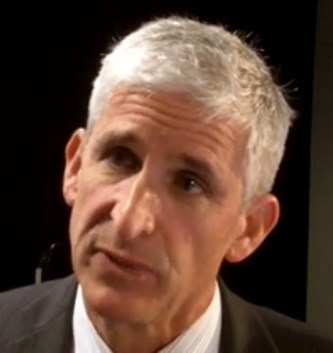User login
SAN FRANCISCO – Results from the ABSORB III pivotal trial of the Absorb bioresorbable vascular scaffold will likely soon bring the device to the U.S. market, where it initially will be appropriate for a minority of patients with coronary artery disease, Dr. Daniel I. Simon said in an interview during the Transcatheter Cardiovascular Therapeutics annual meeting.
“I suspect its penetration will be no different than in Europe, where it’s used on about 10%-15% of patients, for certain niche patients. There will be target populations,” said Dr. Simon, professor and chief of cardiovascular medicine at University Hospitals Case Medical Center in Cleveland.
One attractive coronary candidate for treatment with bioresorbable vascular scaffolds would be a middle-aged man with diffuse and distal stenoses in his left anterior descending coronary artery and disease that’s not especially suitable for coronary bypass surgery that if stented would likely result in 70 mm or more in stent length, posing a high long-term risk for restenosis. In such patients devices that disappear after 3 years are attractive to avoid what might otherwise be a long stretch of metal, Dr. Simon said at the meeting sponsored by the Cardiovascular Research Foundation.
Dr. Simon has been an advisor to Medtronic and Heart Flow and he was an investigator on the ABSORB III trial, sponsored by Abbott Vascular.
The video associated with this article is no longer available on this site. Please view all of our videos on the MDedge YouTube channel
On Twitter @mitchelzoler
SAN FRANCISCO – Results from the ABSORB III pivotal trial of the Absorb bioresorbable vascular scaffold will likely soon bring the device to the U.S. market, where it initially will be appropriate for a minority of patients with coronary artery disease, Dr. Daniel I. Simon said in an interview during the Transcatheter Cardiovascular Therapeutics annual meeting.
“I suspect its penetration will be no different than in Europe, where it’s used on about 10%-15% of patients, for certain niche patients. There will be target populations,” said Dr. Simon, professor and chief of cardiovascular medicine at University Hospitals Case Medical Center in Cleveland.
One attractive coronary candidate for treatment with bioresorbable vascular scaffolds would be a middle-aged man with diffuse and distal stenoses in his left anterior descending coronary artery and disease that’s not especially suitable for coronary bypass surgery that if stented would likely result in 70 mm or more in stent length, posing a high long-term risk for restenosis. In such patients devices that disappear after 3 years are attractive to avoid what might otherwise be a long stretch of metal, Dr. Simon said at the meeting sponsored by the Cardiovascular Research Foundation.
Dr. Simon has been an advisor to Medtronic and Heart Flow and he was an investigator on the ABSORB III trial, sponsored by Abbott Vascular.
The video associated with this article is no longer available on this site. Please view all of our videos on the MDedge YouTube channel
On Twitter @mitchelzoler
SAN FRANCISCO – Results from the ABSORB III pivotal trial of the Absorb bioresorbable vascular scaffold will likely soon bring the device to the U.S. market, where it initially will be appropriate for a minority of patients with coronary artery disease, Dr. Daniel I. Simon said in an interview during the Transcatheter Cardiovascular Therapeutics annual meeting.
“I suspect its penetration will be no different than in Europe, where it’s used on about 10%-15% of patients, for certain niche patients. There will be target populations,” said Dr. Simon, professor and chief of cardiovascular medicine at University Hospitals Case Medical Center in Cleveland.
One attractive coronary candidate for treatment with bioresorbable vascular scaffolds would be a middle-aged man with diffuse and distal stenoses in his left anterior descending coronary artery and disease that’s not especially suitable for coronary bypass surgery that if stented would likely result in 70 mm or more in stent length, posing a high long-term risk for restenosis. In such patients devices that disappear after 3 years are attractive to avoid what might otherwise be a long stretch of metal, Dr. Simon said at the meeting sponsored by the Cardiovascular Research Foundation.
Dr. Simon has been an advisor to Medtronic and Heart Flow and he was an investigator on the ABSORB III trial, sponsored by Abbott Vascular.
The video associated with this article is no longer available on this site. Please view all of our videos on the MDedge YouTube channel
On Twitter @mitchelzoler
EXPERT ANALYSIS FROM TCT 2015
